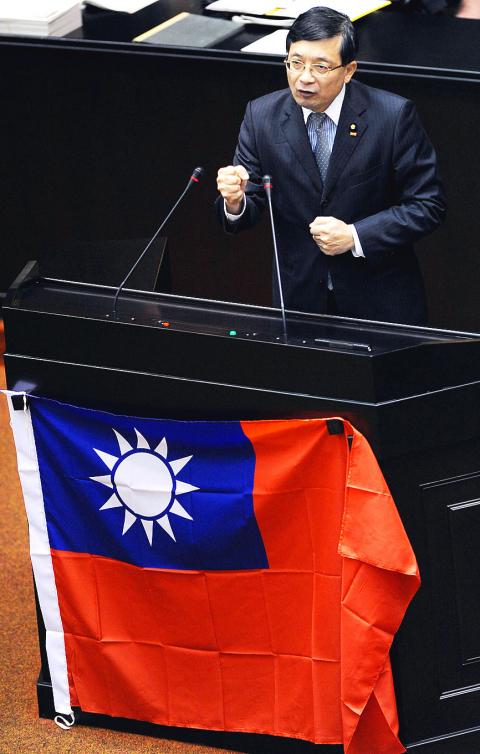After being tipped off by an employee at Chang Chi Foodstuff Factory Co (大統長基), Changhua County’s Bureau of Health said it found that the company had been using low-grade olive-pomace oil and mixing it with other types of cheap oils before selling it directly in markets or to big companies, such as Ting Hsin International Group (頂新集團) and Formosa Oilseed Processing Co (福懋).
Instead of importing and selling extra virgin olive oil, which costs between NT$110 and NT$200 per kilogram, as it has claimed, Chang Chi had mainly used olive-pomace oil, which costs only NT$70 (US$2.30) per kilogram, for its edible oil production, the employee told the bureau.
By mixing olive-pomace oil with 58 percent cottonseed oil and 10 percent extra virgin olive oil, Chang Chi was able to lower its costs by at least NT$50 per kilogram, and then sell the adulterated oil products to Ting Hsin and Formosa for NT$98 per kilogram, the employee said.

Photo: Chu Pei-hsiung, Taipei Times
However, the bureau said it could not verify the worker’s claim that Chang Chi added 10 percent extra virgin olive oil, which the employee said was imported and stored in a distinctive blue barrel.
According to experts, the highest grade of olive oil comes from the first pressing, usually called cold press or extra virgin. The product from the second pressing using mechanical means is considered second-rate, and olive-pomace oil, which is extracted from the leftovers, is the lowest grade, they said.
The bureau said that Formosa Oilseed also added canola oil to the products it bought from Chang Chi, pushing down its costs to NT$64 per kilogram, before selling them as extra virgin olive oil — although they contained only about 21 percent olive oil — under its own brand.
While Ting Hsin had not adulterated the oil further, it priced its oil products at NT$306 per kilogram, nearly triple its cost, the bureau said.
Chang Chi-yue (張基郁), a professor at Dayeh University’s bioindustry technology department, said that olive-pomace oil is usually extracted by adding n-hexane as a solvent and then refined to remove n-hexane residues, which could damage the liver, kidney or the nervous system.
Changhua County Bureau of Health director-general Yeh Yen-po (葉彥伯) said the agency does not know whether Chang Chi had refined its imported olive-pomace oil.
Meanwhile, the Changhua County District Prosecutors’ Office said that over the past six years, Chang Chi had sold 386,400kg of adulterated oil to Ting Hsin and 749,000kg to Formosa Oilseed, making about NT$128 million in profit.
It added that the company had made more than NT$1.9 billion in illegal gains, through direct sales and sales to other companies.
Additional reporting by Tang Shih-ming and Chang Tsung-chiu

In his National Day Rally speech on Sunday, Singaporean Prime Minister Lawrence Wong (黃循財) quoted the Taiwanese song One Small Umbrella (一支小雨傘) to describe his nation’s situation. Wong’s use of such a song shows Singapore’s familiarity with Taiwan’s culture and is a perfect reflection of exchanges between the two nations, Representative to Singapore Tung Chen-yuan (童振源) said yesterday in a post on Facebook. Wong quoted the song, saying: “As the rain gets heavier, I will take care of you, and you,” in Mandarin, using it as a metaphor for Singaporeans coming together to face challenges. Other Singaporean politicians have also used Taiwanese songs

NORTHERN STRIKE: Taiwanese military personnel have been training ‘in strategic and tactical battle operations’ in Michigan, a former US diplomat said More than 500 Taiwanese troops participated in this year’s Northern Strike military exercise held at Lake Michigan by the US, a Pentagon-run news outlet reported yesterday. The Michigan National Guard-sponsored drill involved 7,500 military personnel from 36 nations and territories around the world, the Stars and Stripes said. This year’s edition of Northern Strike, which concluded on Sunday, simulated a war in the Indo-Pacific region in a departure from its traditional European focus, it said. The change indicated a greater shift in the US armed forces’ attention to a potential conflict in Asia, it added. Citing a briefing by a Michigan National Guard senior

CHIPMAKING INVESTMENT: J.W. Kuo told legislators that Department of Investment Review approval would be needed were Washington to seek a TSMC board seat Minister of Economic Affairs J.W. Kuo (郭智輝) yesterday said he received information about a possible US government investment in Taiwan Semiconductor Manufacturing Co (TSMC, 台積電) and an assessment of the possible effect on the firm requires further discussion. If the US were to invest in TSMC, the plan would need to be reviewed by the Department of Investment Review, Kuo told reporters ahead of a hearing of the legislature’s Economics Committee. Kuo’s remarks came after US Secretary of Commerce Howard Lutnick on Tuesday said that the US government is looking into the federal government taking equity stakes in computer chip manufacturers that

CLAMPING DOWN: At the preliminary stage on Jan. 1 next year, only core personnel of the military, the civil service and public schools would be subject to inspections Regular checks are to be conducted from next year to clamp down on military personnel, civil servants and public-school teachers with Chinese citizenship or Chinese household registration, the Mainland Affairs Council (MAC) said yesterday. Article 9-1 of the Act Governing Relations Between the People of the Taiwan Area and the Mainland Area (臺灣地區與大陸地區人民關係條例) stipulates that Taiwanese who obtain Chinese household registration or a Chinese passport would be deprived of their Taiwanese citizenship and lose their right to work in the military, public service or public schools, it said. To identify and prevent the illegal employment of holders of Chinese ID cards or